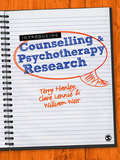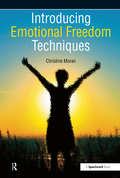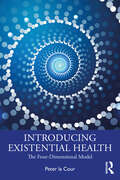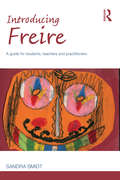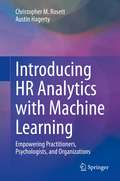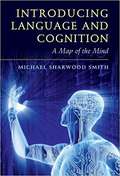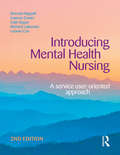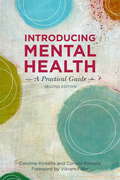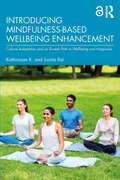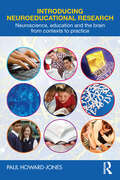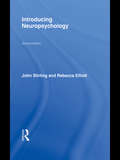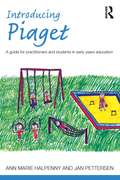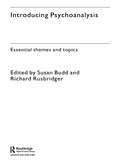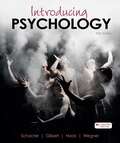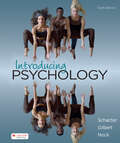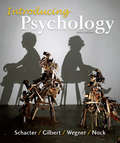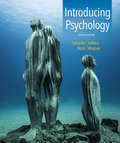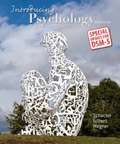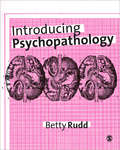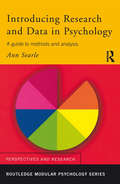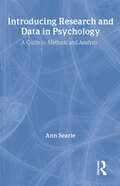- Table View
- List View
Introducing Counselling and Psychotherapy Research
by Dr William West Terry Hanley Miss Clare Lennie'An unusually thoughtful, methodical, engaging text tackling essential research issues in an accessible and attractive way' - Colin Feltham Emeritus Professor of Critical Counselling Studies, Sheffield Hallam University. Introducing Counselling and Psychotherapy Research provides an accessible yet thorough overview of the place that research has in the world of therapy. It introduces the reader to the language of research and helps students to identify themselves as researchers by supporting the development of their research literacy and awareness. Structured around common training topics, the book provides: - consideration of what research is and why people do it - discussion of key issues that individuals should consider before embarking on a research project - an informed overview of common research methodologies and methods - a reflection upon the need to place ethical mindfulness at the fore of any research project - advice and information on what you can do with your research once it's complete. This practical book demystifies research through a model of collaborative and experiential learning, with training exercises, student reflections, further reading, guidance on how to complete a thesis or dissertation, study skills and tips on how to use research supervision and dissemination. Terry Hanley, Clare Lennie and William West work as directors and lecturers on the Counselling and Counselling Psychology programmes at the University of Manchester.
Introducing Emotional Freedom Techniques
by Moran ChristineThis title offers simple and effective techniques for emotional health and wellbeing. Emotional Freedom Techniques (EFT) is an energy therapy that is rapidly gaining recognition as a simple, yet very effective way to aid emotional and physical wellbeing. The techniques empower individuals to make their own changes in their thinking and feeling, by combining focus on an issue whilst tapping on the body's energy system. EFT provides highly flexible, easy-to-use and practical solutions for a huge range of emotional issues across all age groups. This book is a comprehensive information resource and 'how to' guide for health professionals and adults to introduce EFT into their day-to-day lives. It provides an extensive exploration of how EFT can be successfully applied to a wide range of social, emotional, behavioural and health issues. It includes case examples of phobias, fears, issues around behaviour, confidence, health issues, speech problems, depression, stress, anger, addictions, abuse, performance issues and managing pain. It offers an overview of some of the latest perspectives within neuroscience and physiology which reflect the changes that occur naturally when using EFT.
Introducing Existential Health: The Four-Dimensional Model
by Peter la CourIntroducing Existential Health unfolds this evolving concept and places it in the context of common understandings of health. It presents existential health as a vital dimension in understanding human well-being, complementing the traditional biopsychosocial model. It critiques reductionist and mechanistic views of health and showcases a new four- dimensional model in healthcare practice and design that integrates biological, psychological, social, and existential dimensions. Presented as a valid alternative to the biopsychosocial model, it provides modern system thinking and a holistic understanding centred around meaning and the first- person perspective to give a voice to intersectional discourses and encourage equality in health.The book traces the historical evolution of health understandings, highlighting the gaps in addressing subjective and existential perspectives. It examines existential health through various lenses, including meaning- making, subjective experiences, and empirical correlations with other dimensions of health. Practical applications are discussed, emphasising the role of existential health in prevention, chronic disease management, and end-of-life care. The book also advocates for educational reforms to include training in existential health approaches and holistic care. By enriching the language and frameworks for existential health, this book aims to inspire a cultural shift in healthcare towards a more integrative and person-centred paradigm.The book is intended for all health professionals interested in the quality of healthcare in modern society and for health education. The models presented in the book are of a heuristic nature, suitable for reflection, discussion, and teaching about health. It is also valuable reading for researchers in academic health professions and those in the development of health politics, searching for arguments and stepping stones for a more holistic health perspective.
Introducing Freire: A guide for students, teachers and practitioners (Introducing Early Years Thinkers)
by Sandra SmidtThe famous Brazilian educator Paulo Freire has influenced educators, teachers and students in a broad tapestry of contexts and countries, as he challenged conventional thinking on how teachers ought to teach and learners ought to learn. By making his ideas accessible and relevant, this insightful and thought-provoking text draws out the relevance and topicality of Freire’s work and applies this to a wide range of educational settings, from adult education, through schools, to early years settings. Themes covered include: the lasting impact of illiteracy; the benefits and potential in becoming literate; literacy, language and power; the differences between banking and dialogic education; the social and political nature of learning. what kind of teaching and learning do we want? Using a variety of practical examples and case studies, Introducing Freire is an essential guide to the work of one of the most significant figures in education in the last century. Fascinating and accessible, this book is for anyone interested in teaching and learning, poverty and affluence, power and powerlessness, and society and change.
Introducing HR Analytics with Machine Learning: Empowering Practitioners, Psychologists, and Organizations
by Christopher M. Rosett Austin HagertyThis book directly addresses the explosion of literature about leveraging analytics with employee data and how organizational psychologists and practitioners can harness new information to help guide positive change in the workplace. In order for today’s organizational psychologists to successfully work with their partners they must go beyond behavioral science into the realms of computing and business acumen. Similarly, today’s data scientists must appreciate the unique aspects of behavioral data and the special circumstances which surround HR data and HR systems. Finally, traditional HR professionals must become familiar with research methods, statistics, and data systems in order to collaborate with these new specialized partners and teams. Despite the increasing importance of this diversity of skill, many organizations are still unprepared to build teams with the comprehensive skills necessary to have high performing HR Analytics functions. And importantly, all these considerations are magnified by the introduction and acceleration of machine learning in HR. This book will serve as an introduction to these areas and provide guidance on building the connectivity across domains required to establish well-rounded skills for individuals and best practices for organizations when beginning to apply advanced analytics to workforce data. It will also introduce machine learning and where it fits within the larger HR Analytics framework by explaining many of its basic tenets and methodologies. By the end of the book, readers will understand the skills required to do advanced HR analytics well, as well as how to begin designing and applying machine learning within a larger human capital strategy.
Introducing Language and Cognition
by Smith Michael SharwoodIn this accessible introduction, Mike Sharwood Smith provides a working model or 'map' of the mind, with language as its centrepiece. Drawing on cutting-edge research across linguistics, psychology and neuroscience, it allows students to quickly grasp how each separate aspect of the mind's operations can be related. This 'big picture' view includes the way the mind makes, stores and loses memories of all kinds as well how its various 'expert systems' combine and collaborate to solve, typically beyond our conscious awareness, the myriad of tasks we are faced with every minute and millisecond of our existence. The book also focuses on language, that is, the mind of monolingual, bilingual and multilingual speakers. It will be of interest to all students wishing to learn more about the complex relationship between language - one of the most important ways in which we define ourselves as human - and the mind.
Introducing Mental Health Nursing: A service user-oriented approach
by Brenda Happell Leanne Cowin Richard Lakeman Leonie Cox Cath RoperIntroducing Mental Health Nursing offers a systematic overview of both the science and the art of caring for people experiencing mental health problems. It addresses the attitudes, knowledge and skills required to provide care for service users across all health-care settings, from specialist mental health services to general hospitals and community care.The authors place the service user at the centre of all aspects of mental health care and emphasise the importance of the therapeutic relationship as the cornerstone of good mental health nursing practice. Emphasis is placed on the role of the nurse as an intrinsic member of the mental health team, and nurses are encouraged to think critically about the perspectives that they bring to their practice.The second edition has been fully revised and updated, with increased focus on Indigenous social and emotional well-being, as well as two new chapters on Recovery and Cultural Safety. A must-have book for undergraduate nursing students, new graduates and professionals changing specialties or simply wishing to refresh their mental health nursing knowledge.'This is a brave and dignified text - beautifully written and conceived and given the current texts available - a must for any serious undergraduate nursing program in an Australian university.' - David Buchanan, De Montfort University, Leicester, United Kingdom'I recommend this text to all students of nursing, whether you intend to pursue a career in this speciality or if you simply desire to provide the best care possible in any field of practice.' - Associate Professor Stephen Elsom RN PhD, Director, Centre for Psychiatric Nursing, The University of Melbourne
Introducing Mental Health, Second Edition: A Practical Guide
by Connor Kinsella Caroline KinsellaThis popular and accessible introduction to mental health is written for students, mental health practitioners and non-qualified professionals. Fully revised, this second edition is up to date with the latest knowledge on mental health conditions, good practice and the law. The authors explain key concepts in easily understandable language, accessible even to those with no prior knowledge of the subject. They detail the major mental health disorders, the issues surrounding them, and provide detailed information on: * treatment and support * risk assessment and management * mental illness and the Criminal Justice System * the Mental Health Act and the Mental Capacity Act Featuring case studies and exercises to assist learning, this is an invaluable resource for anyone working with people who are experiencing mental illness, including students and professionals in health and social care, housing and criminal justice.
Introducing Mental Health, Second Edition: A Practical Guide
by Connor Kinsella Caroline KinsellaThis popular and accessible introduction to mental health is written for students, mental health practitioners and non-qualified professionals. Fully revised, this second edition is up to date with the latest knowledge on mental health conditions, good practice and the law. The authors explain key concepts in easily understandable language, accessible even to those with no prior knowledge of the subject. They detail the major mental health disorders, the issues surrounding them, and provide detailed information on: * treatment and support * risk assessment and management * mental illness and the Criminal Justice System * the Mental Health Act and the Mental Capacity Act Featuring case studies and exercises to assist learning, this is an invaluable resource for anyone working with people who are experiencing mental illness, including students and professionals in health and social care, housing and criminal justice.
Introducing Mindfulness-Based Wellbeing Enhancement: Cultural Adaptation and an 8-week Path to Wellbeing and Happiness
by Kathirasan K. Sunita RaiMindfulness-Based Wellbeing Enhancement (MBWE) integrates Mindfulness and Wellbeing to realize human flourishing and the attainment of happiness. This 9-session program, conducted over 8 weeks, enhances wellbeing, happiness and quality of life through self-understanding and self-awareness. The first part of the book is devoted to presenting mindfulness, wellbeing, the happiness paradigm and the curriculum of the Mindfulness-Based Wellbeing Enhancement (MBWE) program. It presents the foundations of mindfulness-based programs, and how mindfulness intersects with wellbeing. The authors argue, with the support of evidence, that mindfulness is well placed to promote human flourishing rather than limiting its relevance to stress reduction and preventing depression relapse. Several chapters are devoted to presenting the MBWE program comprehensively with weekly agendas, homework, handouts, facilitation guides and practice scripts. The second part of the book presents the evidence base of mindfulness, cultural adaptations for different populations, the therapeutic effectiveness of group learning inherent in Mindfulness-Based Programs and the often-untold history of mindfulness. The authors present the often-neglected Asian roots of Mindfulness and justify how secular Mindfulness, as taught by Jon Kabat-Zinn, is influenced by multiple wisdom traditions as opposed to it being a solely Buddhist practice. This book serves as a hands-on resource for trained mindfulness teachers, psychologists, psychiatrists, psychotherapists, counsellors, social workers, practitioners, educators, coaches, and consultants. It is also suitable for anyone who is interested in the appreciation of mindfulness and human flourishing.
Introducing Mindfulness-Based Wellbeing Enhancement: Cultural Adaptation and an 8-week Path to Wellbeing and Happiness
by Kathirasan K. Sunita RaiMindfulness-Based Wellbeing Enhancement (MBWE) integrates Mindfulness and Wellbeing to realize human flourishing and the attainment of happiness. This 9-session program, conducted over 8 weeks, enhances wellbeing, happiness and quality of life through self-understanding and self-awareness.The first part of the book is devoted to presenting mindfulness, wellbeing, the happiness paradigm and the curriculum of the Mindfulness-Based Wellbeing Enhancement (MBWE) program. It presents the foundations of mindfulness-based programs, and how mindfulness intersects with wellbeing. The authors argue, with the support of evidence, that mindfulness is well placed to promote human flourishing rather than limiting its relevance to stress reduction and preventing depression relapse. Several chapters are devoted to presenting the MBWE program comprehensively with weekly agendas, homework, handouts, facilitation guides and practice scripts.The second part of the book presents the evidence base of mindfulness, cultural adaptations for different populations, the therapeutic effectiveness of group learning inherent in Mindfulness-Based Programs and the often-untold history of mindfulness. The authors present the often-neglected Asian roots of Mindfulness and justify how secular Mindfulness, as taught by Jon Kabat-Zinn, is influenced by multiple wisdom traditions as opposed to it being a solely Buddhist practice.This book serves as a hands-on resource for trained mindfulness teachers, psychologists, psychiatrists, psychotherapists, counsellors, social workers, practitioners, educators, coaches, and consultants. It is also suitable for anyone who is interested in the appreciation of mindfulness and human flourishing.
Introducing Neuroeducational Research: Neuroscience, Education and the Brain from Contexts to Practice
by Paul Howard JonesAmongst educators, scientists and policy-makers there is a growing belief that the field of education can benefit from an understanding of the brain. However, attempts to bring neuroscience and education together have often been hampered by crucial differences in concepts, language and philosophy. In this book, Paul Howard-Jones explores these differences, drawing on the voices of educators and scientists to argue for a new field of enquiry: neuroeducational research. Introducing Neuroeducational Research provides a meaningful bridge between two diverse perspectives on learning. It proposes that any such bridge must serve two goals that are critically related to each other: it must enrich both scientific and educational understanding. This challenge gives rise to unique conceptual, methodological and ethical issues that will inevitably characterise this new field, and these are examined and illustrated here through empirical research. Throughout the book, Paul Howard-Jones: Explores ‘neuromyths’ and their impact on educational research Highlights the opportunities to combine biological, social and experiential evidence in understanding how we learn Argues against a ‘brain-based’ natural science of education Introduces clearly the concept of an interdisciplinary neuroeducational approach Builds a methodology for conducting neuroeducational research Draws on case studies and empirical findings to illustrate how a neuroeducational approach can provide a fuller picture of how we learn. Presenting a blueprint for including our knowledge of the brain in education, this book is essential reading for all those concerned with human learning in authentic contexts: educators, scientists and policy-makers alike.
Introducing Neuroeducational Research: Neuroscience, Education and the Brain from Contexts to Practice
by Paul Howard JonesAmongst educators, scientists and policy-makers there is a growing belief that the field of education can benefit from an understanding of the brain. However, attempts to bring neuroscience and education together have often been hampered by crucial differences in concepts, language and philosophy. In this book, Paul Howard-Jones explores these differences, drawing on the voices of educators and scientists to argue for a new field of enquiry: neuroeducational research. Introducing Neuroeducational Research provides a meaningful bridge between two diverse perspectives on learning. It proposes that any such bridge must serve two goals that are critically related to each other: it must enrich both scientific and educational understanding. This challenge gives rise to unique conceptual, methodological and ethical issues that will inevitably characterise this new field, and these are examined and illustrated here through empirical research. Throughout the book, Paul Howard-Jones: Explores ‘neuromyths’ and their impact on educational research Highlights the opportunities to combine biological, social and experiential evidence in understanding how we learn Argues against a ‘brain-based’ natural science of education Introduces clearly the concept of an interdisciplinary neuroeducational approach Builds a methodology for conducting neuroeducational research Draws on case studies and empirical findings to illustrate how a neuroeducational approach can provide a fuller picture of how we learn. Presenting a blueprint for including our knowledge of the brain in education, this book is essential reading for all those concerned with human learning in authentic contexts: educators, scientists and policy-makers alike.
Introducing Neuropsychology: 2nd Edition
by John Stirling Rebecca ElliottIntroducing Neuropsychology, Second Edition investigates the functions of the brain and explores the relationships between brain systems and human behaviour. The material is presented in a jargon-free, easy to understand manner and aims to guide students new to the field through current areas of research. Following a brief history of the discipline and a description of methods in neuropsychology, the remaining chapters review traditional and recent research findings. Both cognitive and clinical aspects of neuropsychology are addressed to illustrate the advances scientists are making (on many fronts) in their quest to understand brain - behaviour relationships in both normal and disturbed functioning. The rapid developments in neuropsychology and cognitive neuroscience resulting from traditional research methods as well as new brain-imaging techniques are presented in a clear and straightforward way. Each chapter has been fully revised and updated and new brain-imaging data are incorporated throughout, especially in the later chapters on Emotion and Motivation, and Executive Functions. As in the first edition, key topics are dealt with in separate focus boxes, and “interim comment” sections allow the reader a chance to “take stock” at regular intervals. The book assumes no particular expertise on the reader’s part in either psychology or brain physiology. Thus, it will be of great interest not only to those studying neuropsychology and cognitive neuroscience, but also to medical and nursing students, and indeed anyone who is interested in learning about recent progress in understanding brain–behaviour relationships.
Introducing Piaget: A guide for practitioners and students in early years education (Introducing Early Years Thinkers)
by Ann Marie Halpenny Jan PettersenJean Piaget was one of the most significant contributors to our current understanding of how children think and learn, from birth through to adolescence. In this comprehensive and accessible new book, Ann Marie Halpenny and Jan Pettersen capture the key concepts and principles of Piaget’s fascinating work on children’s thinking, and explore how thinking evolves and develops from infancy through the early years and beyond. Areas covered in Introducing Piaget include: key milestones and achievements in children’s thinking; understanding the physical world through senses and movement in infancy; supporting the emergence of symbolic thought and language in the early years; understanding object permanence; implications of egocentric thinking in early childhood learning and development. Throughout the book, the consequences of these developments for children’s social, emotional and intellectual development are discussed. Updates on Piaget’s theory are also outlined with reference to more recent work on cognitive development in childhood. Each chapter provides a concise summary of material presented through a consideration of the implications for practice in working with children. A glossary of key Piagetian terms is also included. With a particular focus on how Piaget’s principles and concepts can be applied to children in early childhood, this exciting new book is an invaluable resource for teachers, practitioners and students with an interest in learning and development in the early years.
Introducing Psychoanalysis: Essential Themes and Topics
by Richard Rusbridger Susan BuddIntroducing Psychoanalysis brings together leading analysts to explain what psychoanalysis is and how it has developed, setting its ideas in their appropriate social and intellectual context. Based on lectures given at the British Psychoanalytic Society, the contributions capture the diversity of opinion among analysts to provide a clear and dynamic presentation of concepts such as: sexual perversions trauma and the possibility of recovery phantasy and reality interpreting and transference two views of the Oedipus complex projective identification the paranoid-schizoid and depressive positions symbolism and dreams. Frequently misunderstood subjects are demystified and the contributors' wealth of clinical and supervisory experience ensures that central concepts are explained with refreshing clarity. Clinical examples are included throughout and provide a valuable insight into the application of psychoanalytic ideas. This overview of the wide variety of psychoanalytic ideas that are current in Britain today will appeal to all those training and practicing in psychoanalysis and psychoanalytic psychotherapy, as well as those wishing to broaden their knowledge of this field.
Introducing Psychology
by Daniel Gilbert Daniel Schacter Daniel Wegner Matthew NockWith Macmillan’s superior content delivered by LaunchPad (comprehensive course) or Achieve Read & Practice (e-book + online homework), Introducing Psychology keeps students turning the pages and fully engaged online. The remarkable author team (each an accomplished teacher and scientist; three of them popular general interest writers) introduce psychology’s scientific foundations with offbeat, example-rich writing and engrossing online activities that make this anything but a typical textbook. Shaped by the authors’ ongoing research and user feedback, the thoroughly updated new edition centers on the theme, “For the love of science,” and offers more study support with new Learning Outcomes LaunchPad for this edition includes the popular Data Visualization Activities—a unique resource for building students’ quantitative reasoning skills.
Introducing Psychology
by Daniel Gilbert Daniel Schacter Matthew NockA uniquely compelling introduction to psychology from three well-known researcher/educators/writers.
Introducing Psychology
by Daniel M. Wegner Daniel L. Schacter Daniel T. Gilbert Matthew K. NockWith an author team equally at home in the classroom, in the lab, or on the bestseller list, Introducing Psychology is a textbook written to keep students turning the pages. It offers expert coverage of psychology's scientific foundations, but communicates with students in a style that's anything but that of a typical textbook. The new edition, featuring new coauthor Matt Nock, keeps the level of excitement and engagement high, with quirky and unforgettable examples, and reminders throughout that the human perspectives and the critical thinking skills required to study psychology will serve them well in college and throughout their lives.
Introducing Psychology
by Daniel M. Wegner Daniel L. Schacter Daniel T. Gilbert Matthew K. NockIntroducing Psychology is distinguished by an author team equally at home in the classroom, in the lab, and on the bestsellers list, with each author an expert teacher and accomplished researcher, and with three of the authors having written popular general interest books. It's a textbook written to keep students turning the pages, introducing students to psychology’s scientific foundations with an offbeat, example-rich writing style that's anything but that of a typical textbook. <p><p> This edition of Introducing Psychology has been completely retooled for the classroom. For the first time, each chapter section begins with Learning Outcomes to help students come away from the reading with a "big picture" understanding of psychology as a living science, not just a collection of facts. This edition also includes a new feature called A World of Difference, drawing on pivotal research to show the importance of sex, gender, culture, SES, and ethnicity in understanding psychology. Also highlighted—the popular Data Visualization Activities, a unique resource for building quantitative reasoning skills.
Introducing Psychology With Updates On DSM-5
by Daniel M. Wegner Daniel L. Schacter Daniel T. GilbertA great read is just the beginning. . . Instructor and student evaluations from coast to coast attest to the Dans' captivating writing These award-winning bestselling authors know how to enthrall students with the subject they love best--psychology But in the new edition of Introducing Psychology, they go even further to ensure that students won't commit one of the seven sins of memory--forgetting what they just read Special Cue Questions and Critical Thinking questions give students the opportunity to process psychological concepts and aid their understanding and memory And if you've ever heard someone parrot a widespread misconception, you'll welcome the new Changing Minds questions, short scenarios which ask students to confront common misunderstandings of psychological phenomena Now the book that students love to read is as unforgettable as ever! DSM 5 Updates Available for Fall 2014 classes, this update version features new content from the Dans in response to the release of the DSM-5. This new content is integrated into the text without changing pagination or the structure of the chapters. A special DSM 5 Supplement by the Matthew Nock, new coauthor with the Dans of Psychology, Third Edition, is available for Fall 2013 and Spring and Summer 2014 courses. View the Page-Referenced Guide to the DSM-5 updates for Psychology.
Introducing Psychopathology
by Betty RuddIntroducing Psychopathology is an essential course companion for counselling, psychotherapy and counselling psychology trainees. It explains how to describe and diagnose client problems in clear, accessible language, demystifying the concept of psychopathology and revealing it as an integral aspect of training and practice. The book is entirely comprehensive in its coverage of client problems, groups, methods of assessment, up-to-date research and settings, covering crucial topics from assessment and diagnosis to the clinical symptoms of emotional distress, including severe or enduring disorders like schizophrenia and borderline personality disorder providing a framework for psychiatric diagnosis and classification and covering risk assessment in detail concluding with a chapter on holistic approaches and emotional wellbeing. Case studies and exercises throughout the book make sense of the theory in real-life practice and the author′s enthusiasm for her subject makes for a uniquely engaging, readable guide to the complexities of psychopathologies.
Introducing Research and Data in Psychology: A Guide to Methods and Analysis (Routledge Modular Psychology Ser.)
by Ann SearleIntroducing Research and Data in Psychology shows how research design and data analysis are attainable and useful skills. It introduces both experimental and non-experimental methods of research and the analysis of data using both descriptive and inferential statistics. The uses, interpretation and calculation of common two sample statistical tests are explained. This comprehensive textbook includes the following designed features to help with technique:Practice exam answers to show how to achieve a higher gradeChapter summariesGlossaryCase studies and examplesExercises and a full bibliography.
Introducing Research and Data in Psychology: A Guide to Methods and Analysis (Routledge Modular Psychology)
by Ann SearleIntroducing Research and Data in Psychology shows how research design and data analysis are attainable and useful skills. It introduces both experimental and non-experimental methods of research and the analysis of data using both descriptive and inferential statistics. The uses, interpretation and calculation of common two sample statistical tests are explained. This comprehensive textbook includes the following designed features to help with technique:* Practice exam answers to show how to achieve a higher grade* Chapter summaries* Glossary* Case studies and examples* Exercises and a full bibliography
Introducing Second Language Acquisition
by Muriel Saville-TroikeWritten for students encountering the topic for the first time, this is a clear and practical introduction to second language acquisition (SLA). Using non-technical language, it explains how a second language is acquired; what the learner of a second language needs to know; and why some learners are more successful than others. This new edition of Muriel Saville-Troike's bestselling textbook introduces in a step-by-step fashion a range of fundamental concepts, such as SLA in adults and children, in formal and informal learning contexts and in diverse socio-cultural settings. Taking an interdisciplinary approach, it encourages students to consider SLA from linguistic, psychological and social perspectives. Providing a solid foundation in SLA, this book has become the leading introduction to the field for students of linguistics, psychology and education, and trainee language teachers.
